| Reviews & Columns |
|
Reviews DVD TV on DVD Blu-ray 4K UHD International DVDs In Theaters Reviews by Studio Video Games Features Collector Series DVDs Easter Egg Database Interviews DVD Talk Radio Feature Articles Columns Anime Talk DVD Savant Horror DVDs The M.O.D. Squad Art House HD Talk Silent DVD
|
DVD Talk Forum |
|
|
| Resources |
|
DVD Price Search Customer Service #'s RCE Info Links |
|
Columns
|
|
|
Cell, The
New Line // R // July 7, 2015
List Price: $14.98 [Buy now and save at Amazon]
The Film:
The process of interpreting one's dreams is a constant war between style and substance. Certain things appearing in them might relate to deep-seated elements of the person's subconscious, while others might simply be the mind's way of playing around with meaningless "rule of cool" creativity, though that won't stop the diligent from trying to find meaning in them. Sometimes, a horse is just a horse -- of course, of course. The visionary perspective of Tarsem Singh arrives tailor-made for bringing the abstractness of a serial killer's warped, morphing dreamscape to the big screen, allowing his imagination to go every which way with metaphorical and visual surrealism. These are the strengths of Singh's first directorial effort, The Cell, those lengthy descents into the hostile realm of someone else's dormant imagination which lavishly embrace the absence of boundaries, but those moments of traversing the dark corners of the mind struggle against requisite stale crime-drama and slack performances to get there.
Social worker Catherine Deane -- a good-natured but shallow personality delivered by Jennifer Lopez -- has been working with an experimental, potentially dangerous form of therapy that involves engaging unresponsive individuals in their mental landscape, coupled with a cocktail of drugs and refined technology used to map the brain. While under, for better or for worse, she can interact with and help to control the unpredictable dreams of the host party, though her studies have been limited to a single child participant up until this point.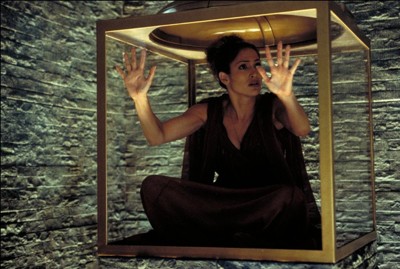 Working against minimal evidence proving the validity of her therapy, Catherine and the science team's research get offered a chance to test the breadth of its capabilities when an unconscious serial killer arrives at their facility, at the behest of the FBI and detective Peter Novak (Vince Vaughn), in hopes of probing his mind to discover where his next captive victim has been locked away. A mix of hesitation and desperation to justify her work leads Catherine to accept, strapping in for an invasive trip into the volatile mind of someone with whom she has no rapport.
Working against minimal evidence proving the validity of her therapy, Catherine and the science team's research get offered a chance to test the breadth of its capabilities when an unconscious serial killer arrives at their facility, at the behest of the FBI and detective Peter Novak (Vince Vaughn), in hopes of probing his mind to discover where his next captive victim has been locked away. A mix of hesitation and desperation to justify her work leads Catherine to accept, strapping in for an invasive trip into the volatile mind of someone with whom she has no rapport.
Penned by Thor and I Am Legend screenwriter Mark Protosevich, also his first big-screen project, The Cell demands a lot of narrative heavy-lifting to be done in a short amount of time, crafting both a semi-credible, empathetic means of entering mental landscapes and a disturbing maze of a mind that must be explored. Clunky exposition and dull policework around the serial killings are the bullets Singh bites in getting to his stronger suits, concentrating instead on Catherine's exhausted dedication and the troubling modus operandi of Carl Stargher (an eerie Vincent D'Onofrio), who uses water traps and suspension hooks to satisfy his perverse appetites. Despite the throwaway crime-scene procedure and Vince Vaughn's blank handling of an investigator, there's still something to admire in how the film nonchalantly subverts expectations by capturing the villain so early on, even if it has ulterior motives in doing so. There isn't much depth here, though; the film clearly focuses on shoving knowable characters into the unknowable waters of interacting with the subconscious.
Once there, however, The Cell morphs into a moderately graphic feast for the eyes, one that's both bizarre and restrained in its presentation of Stargher's mind. Through the lens of fellow music-video maker Paul Laufer, director Singh keeps the majority of Catherine's exploration confined within trippy interiors that strengthen the notion of all this transpiring in the frightening prison of Stargher's brain, peeking into manifestations of his kinks, his self-image, and the small pieces of decency that scurry around in the darkness. At times, the imagery rendered here does a slightly better job recalling the morbid, figurative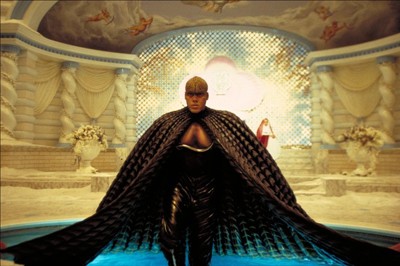 sensibilities of the Silent Hill videogame series than even Christopher Gans' (strong) live-action adaptation, where contorted bodies and grimy walls pull few punches in emphasizing the nightmarish surrealism going on, exploring the freedom of the film's R-rating. Catherine's journey through the facets of his psyche, and through flashbacks to the events that shaped him into such a warped person, initially accomplishes a lot through hypnotic visuals that float between meaningful and trivial discoveries.
sensibilities of the Silent Hill videogame series than even Christopher Gans' (strong) live-action adaptation, where contorted bodies and grimy walls pull few punches in emphasizing the nightmarish surrealism going on, exploring the freedom of the film's R-rating. Catherine's journey through the facets of his psyche, and through flashbacks to the events that shaped him into such a warped person, initially accomplishes a lot through hypnotic visuals that float between meaningful and trivial discoveries.
The Cell begins to lose its resolve when the real cerebral danger of the situation comes into play, though, the idea that Stargher's mind can lash back and have real-world implications. While an intriguing idea that spikes the suspenseful urgency later on, it stretches credibility with that bridged consciousness as Catherine continues her mind-probing, ever questioning why the serial killer's dreamscape and imposing avatar -- the mentality of a man who plays with corpses while watching another victim suffer through a video feed -- doesn't have a vastly more aggressive temperament towards intruders. Part of the reason, naturally, is to bolster Catherine's presence as a capable mental opponent (and victim for him to play with), but a paralyzing final act detracts from that potential willpower while veering into nonsensical territory. Unaided by flat, cursory performances from both Jennifer Lopez and Vince Vaughn as they essentially become puppets for Singh's garish allusions, it ultimately sleeps through the moments where it really could've blurred the line between vivid style and unsettling substance.
The Blu-ray:
Video and Audio:
There's a lot of beauty to be seen in The Cell, but it's hard to know what to make of it through WB/New Line's suitable but challenged 2.35:1-framed, 1080p AVC encode. Scenes outside of Stargher's dreamscape are easier to interpret: depth and clarity are moderately satisfying for a fifteen-year-old, 35mm film, sporting satisfying texture details and light response in the ripples of Catherine's maroon suit and in the tendrils of her hair. Colors appear a little warm, outside of blue lights and vivid foliage, while the natural film presence results in a bit of unruly grain and lacking focus. The situation changes within Stargher's mind, where the combination of lavish effects and palette tweaks make for a complicated HD experience. Fine detail within textured walls, ornate makeup, and lavish costume are generally strong, while the intended vividness of shades -- assertive purple fabric, red collars against pale blue skin, gore -- impresses. However, the heavy filters and contrast boost leave the image feeling dimensionally flat, weirdly hazy, and the black levels oppressive, especially the "deeper" Catherine goes into the dreamscape. There are strengths and accuracies, but it's not a terribly robust experience.
The 5.1 DTS-HD Master Audio boasts far more high-definition vigor, exploring the surround channels and telegraphing unsettling, fierce clarity in sound effects. Potent elements like the rushing of water into a glass prison cell, the violent rattling of chains in an echoing basement, and mechanical slamming and spreading of glass dividers from a ceiling push the track to its limits with razor-sharp clarity and an even, natural sprawl across the channels. Lighter components, like the splashing of liquid in a bathtub and the dripping of water behind Catherine in the dream realm, are appropriately faint and clear where needed. The most assertive points in the track, and also the most expansive, are the music and the soundtrack-driven atmospheric touches (such as the overbearing weight of Stargher's psychosis in the real world), which are the primary, forceful drivers to the rear channels. Separation remains rather satisfying from start to finish, though a few effects seem like they're either too confined to the front (shower water dropping) or move too much to the back (the barking of a dog), while dialogue commands a natural and discernible presence throughout. Very strong track here. English, French, German, Italian, Spanish, Dutch, and Castellano subs are available.
Special Features:
Nothing new in the extras department for this catalogue release from WB, but, as per their usual way of doing things nowadays, they have included the bonus materials from the standard-definition release from many moons ago ... and being one of New Line's DVD releases in their prime, it's loaded with good stuff. A pair of Audio Commentaries leads the pack, one with director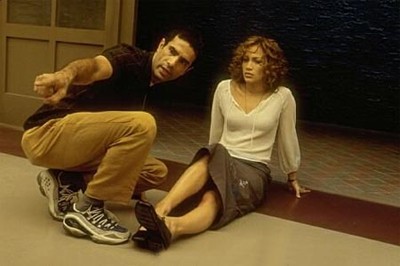 Tarsem Singh and another with six different individuals from the Production Crew. Both are intriguing tracks: director Singh intently explores his method and his production orchestration, discussing his filming locations, screen tests, and the pitfalls of including clues next to Jennifer Lopez in her underwear; the production crew track skillfully switches between separated participants and touches on a bunch of topics, though the flow's naturally off considering the track's structure. Also on the commentary front are a collection of eight Deleted Scenes, available both with Tarsem Singh's comments and without.
Tarsem Singh and another with six different individuals from the Production Crew. Both are intriguing tracks: director Singh intently explores his method and his production orchestration, discussing his filming locations, screen tests, and the pitfalls of including clues next to Jennifer Lopez in her underwear; the production crew track skillfully switches between separated participants and touches on a bunch of topics, though the flow's naturally off considering the track's structure. Also on the commentary front are a collection of eight Deleted Scenes, available both with Tarsem Singh's comments and without.
Style as Substance: Reflections on Tarsem (11:51, 16x9) has moments of interest within it, but there's a lot of reverence for the film -- and for Tarsem -- crammed within that you've got to weed through in order to get to the meat of the material, like the behind-the-scenes shots and the deeper production talk. The six Special Effects Milti-Angle Vingettes have also been included that are far more in-depth in than the pseudo making-of piece, but the fancy method of switching in and out of the different bonus-view options has been replaced with raw files of all the content thrown together back-to-back, so you're hearing the same interview discussion three times with different material on-screen. A Theatrical Trailer (1:23, 4x3) and a largely similar International Trailer (1:20, 16x9) round out the rest of the extras.
Final Thoughts:
The Cell seems like it was specifically designed to fill the space between popular serial-killer thrillers like Se7en and Silence and the Lambs and plugged-in reality benders like eXistenZ and The Matrix. Tarsem Singh's signature visual flair finds a willing subject in the dreamscape of a warped murderer and sexual deviant, explored by Jennifer Lopez' noble social worker as she and the FBI attempt to locate his last imprisoned victim before time runs out. While the visuals are mesmerizing and the concept vaguely philosophical, it makes too many sacrifices in its plotting and depth of character to get the audience there, and that gamble results in a striking sensory experience without much thematic weight in its serviceable altered state of being. Warner's Blu-ray sounds great and comes with a plethora of vintage extras, which helps to ease the blow of a middling transfer that might've earned the disc a slightly higher recommendation. Rent It.
Thomas Spurlin, Staff Reviewer -- DVDTalk Reviews | Personal Blog/Site
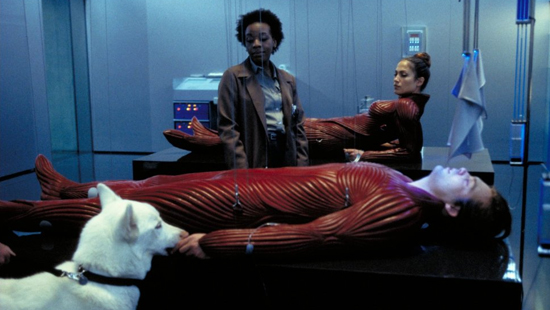 |
The process of interpreting one's dreams is a constant war between style and substance. Certain things appearing in them might relate to deep-seated elements of the person's subconscious, while others might simply be the mind's way of playing around with meaningless "rule of cool" creativity, though that won't stop the diligent from trying to find meaning in them. Sometimes, a horse is just a horse -- of course, of course. The visionary perspective of Tarsem Singh arrives tailor-made for bringing the abstractness of a serial killer's warped, morphing dreamscape to the big screen, allowing his imagination to go every which way with metaphorical and visual surrealism. These are the strengths of Singh's first directorial effort, The Cell, those lengthy descents into the hostile realm of someone else's dormant imagination which lavishly embrace the absence of boundaries, but those moments of traversing the dark corners of the mind struggle against requisite stale crime-drama and slack performances to get there.
Social worker Catherine Deane -- a good-natured but shallow personality delivered by Jennifer Lopez -- has been working with an experimental, potentially dangerous form of therapy that involves engaging unresponsive individuals in their mental landscape, coupled with a cocktail of drugs and refined technology used to map the brain. While under, for better or for worse, she can interact with and help to control the unpredictable dreams of the host party, though her studies have been limited to a single child participant up until this point.
 Working against minimal evidence proving the validity of her therapy, Catherine and the science team's research get offered a chance to test the breadth of its capabilities when an unconscious serial killer arrives at their facility, at the behest of the FBI and detective Peter Novak (Vince Vaughn), in hopes of probing his mind to discover where his next captive victim has been locked away. A mix of hesitation and desperation to justify her work leads Catherine to accept, strapping in for an invasive trip into the volatile mind of someone with whom she has no rapport.
Working against minimal evidence proving the validity of her therapy, Catherine and the science team's research get offered a chance to test the breadth of its capabilities when an unconscious serial killer arrives at their facility, at the behest of the FBI and detective Peter Novak (Vince Vaughn), in hopes of probing his mind to discover where his next captive victim has been locked away. A mix of hesitation and desperation to justify her work leads Catherine to accept, strapping in for an invasive trip into the volatile mind of someone with whom she has no rapport. Penned by Thor and I Am Legend screenwriter Mark Protosevich, also his first big-screen project, The Cell demands a lot of narrative heavy-lifting to be done in a short amount of time, crafting both a semi-credible, empathetic means of entering mental landscapes and a disturbing maze of a mind that must be explored. Clunky exposition and dull policework around the serial killings are the bullets Singh bites in getting to his stronger suits, concentrating instead on Catherine's exhausted dedication and the troubling modus operandi of Carl Stargher (an eerie Vincent D'Onofrio), who uses water traps and suspension hooks to satisfy his perverse appetites. Despite the throwaway crime-scene procedure and Vince Vaughn's blank handling of an investigator, there's still something to admire in how the film nonchalantly subverts expectations by capturing the villain so early on, even if it has ulterior motives in doing so. There isn't much depth here, though; the film clearly focuses on shoving knowable characters into the unknowable waters of interacting with the subconscious.
Once there, however, The Cell morphs into a moderately graphic feast for the eyes, one that's both bizarre and restrained in its presentation of Stargher's mind. Through the lens of fellow music-video maker Paul Laufer, director Singh keeps the majority of Catherine's exploration confined within trippy interiors that strengthen the notion of all this transpiring in the frightening prison of Stargher's brain, peeking into manifestations of his kinks, his self-image, and the small pieces of decency that scurry around in the darkness. At times, the imagery rendered here does a slightly better job recalling the morbid, figurative
 sensibilities of the Silent Hill videogame series than even Christopher Gans' (strong) live-action adaptation, where contorted bodies and grimy walls pull few punches in emphasizing the nightmarish surrealism going on, exploring the freedom of the film's R-rating. Catherine's journey through the facets of his psyche, and through flashbacks to the events that shaped him into such a warped person, initially accomplishes a lot through hypnotic visuals that float between meaningful and trivial discoveries.
sensibilities of the Silent Hill videogame series than even Christopher Gans' (strong) live-action adaptation, where contorted bodies and grimy walls pull few punches in emphasizing the nightmarish surrealism going on, exploring the freedom of the film's R-rating. Catherine's journey through the facets of his psyche, and through flashbacks to the events that shaped him into such a warped person, initially accomplishes a lot through hypnotic visuals that float between meaningful and trivial discoveries. The Cell begins to lose its resolve when the real cerebral danger of the situation comes into play, though, the idea that Stargher's mind can lash back and have real-world implications. While an intriguing idea that spikes the suspenseful urgency later on, it stretches credibility with that bridged consciousness as Catherine continues her mind-probing, ever questioning why the serial killer's dreamscape and imposing avatar -- the mentality of a man who plays with corpses while watching another victim suffer through a video feed -- doesn't have a vastly more aggressive temperament towards intruders. Part of the reason, naturally, is to bolster Catherine's presence as a capable mental opponent (and victim for him to play with), but a paralyzing final act detracts from that potential willpower while veering into nonsensical territory. Unaided by flat, cursory performances from both Jennifer Lopez and Vince Vaughn as they essentially become puppets for Singh's garish allusions, it ultimately sleeps through the moments where it really could've blurred the line between vivid style and unsettling substance.
The Blu-ray:
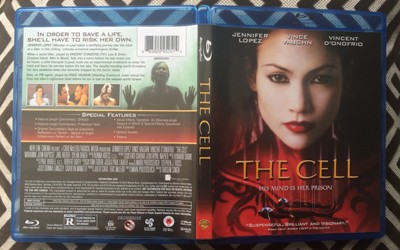 | 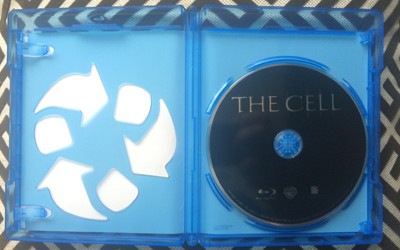 |
Video and Audio:
There's a lot of beauty to be seen in The Cell, but it's hard to know what to make of it through WB/New Line's suitable but challenged 2.35:1-framed, 1080p AVC encode. Scenes outside of Stargher's dreamscape are easier to interpret: depth and clarity are moderately satisfying for a fifteen-year-old, 35mm film, sporting satisfying texture details and light response in the ripples of Catherine's maroon suit and in the tendrils of her hair. Colors appear a little warm, outside of blue lights and vivid foliage, while the natural film presence results in a bit of unruly grain and lacking focus. The situation changes within Stargher's mind, where the combination of lavish effects and palette tweaks make for a complicated HD experience. Fine detail within textured walls, ornate makeup, and lavish costume are generally strong, while the intended vividness of shades -- assertive purple fabric, red collars against pale blue skin, gore -- impresses. However, the heavy filters and contrast boost leave the image feeling dimensionally flat, weirdly hazy, and the black levels oppressive, especially the "deeper" Catherine goes into the dreamscape. There are strengths and accuracies, but it's not a terribly robust experience.
The 5.1 DTS-HD Master Audio boasts far more high-definition vigor, exploring the surround channels and telegraphing unsettling, fierce clarity in sound effects. Potent elements like the rushing of water into a glass prison cell, the violent rattling of chains in an echoing basement, and mechanical slamming and spreading of glass dividers from a ceiling push the track to its limits with razor-sharp clarity and an even, natural sprawl across the channels. Lighter components, like the splashing of liquid in a bathtub and the dripping of water behind Catherine in the dream realm, are appropriately faint and clear where needed. The most assertive points in the track, and also the most expansive, are the music and the soundtrack-driven atmospheric touches (such as the overbearing weight of Stargher's psychosis in the real world), which are the primary, forceful drivers to the rear channels. Separation remains rather satisfying from start to finish, though a few effects seem like they're either too confined to the front (shower water dropping) or move too much to the back (the barking of a dog), while dialogue commands a natural and discernible presence throughout. Very strong track here. English, French, German, Italian, Spanish, Dutch, and Castellano subs are available.
Special Features:
Nothing new in the extras department for this catalogue release from WB, but, as per their usual way of doing things nowadays, they have included the bonus materials from the standard-definition release from many moons ago ... and being one of New Line's DVD releases in their prime, it's loaded with good stuff. A pair of Audio Commentaries leads the pack, one with director
 Tarsem Singh and another with six different individuals from the Production Crew. Both are intriguing tracks: director Singh intently explores his method and his production orchestration, discussing his filming locations, screen tests, and the pitfalls of including clues next to Jennifer Lopez in her underwear; the production crew track skillfully switches between separated participants and touches on a bunch of topics, though the flow's naturally off considering the track's structure. Also on the commentary front are a collection of eight Deleted Scenes, available both with Tarsem Singh's comments and without.
Tarsem Singh and another with six different individuals from the Production Crew. Both are intriguing tracks: director Singh intently explores his method and his production orchestration, discussing his filming locations, screen tests, and the pitfalls of including clues next to Jennifer Lopez in her underwear; the production crew track skillfully switches between separated participants and touches on a bunch of topics, though the flow's naturally off considering the track's structure. Also on the commentary front are a collection of eight Deleted Scenes, available both with Tarsem Singh's comments and without. Style as Substance: Reflections on Tarsem (11:51, 16x9) has moments of interest within it, but there's a lot of reverence for the film -- and for Tarsem -- crammed within that you've got to weed through in order to get to the meat of the material, like the behind-the-scenes shots and the deeper production talk. The six Special Effects Milti-Angle Vingettes have also been included that are far more in-depth in than the pseudo making-of piece, but the fancy method of switching in and out of the different bonus-view options has been replaced with raw files of all the content thrown together back-to-back, so you're hearing the same interview discussion three times with different material on-screen. A Theatrical Trailer (1:23, 4x3) and a largely similar International Trailer (1:20, 16x9) round out the rest of the extras.
Final Thoughts:
The Cell seems like it was specifically designed to fill the space between popular serial-killer thrillers like Se7en and Silence and the Lambs and plugged-in reality benders like eXistenZ and The Matrix. Tarsem Singh's signature visual flair finds a willing subject in the dreamscape of a warped murderer and sexual deviant, explored by Jennifer Lopez' noble social worker as she and the FBI attempt to locate his last imprisoned victim before time runs out. While the visuals are mesmerizing and the concept vaguely philosophical, it makes too many sacrifices in its plotting and depth of character to get the audience there, and that gamble results in a striking sensory experience without much thematic weight in its serviceable altered state of being. Warner's Blu-ray sounds great and comes with a plethora of vintage extras, which helps to ease the blow of a middling transfer that might've earned the disc a slightly higher recommendation. Rent It.
|
| Popular Reviews |
| Sponsored Links |
|
|
| Sponsored Links |
|
|
| Release List | Reviews | Shop | Newsletter | Forum | DVD Giveaways | Blu-Ray | Advertise |
|
Copyright 2024 DVDTalk.com All Rights Reserved. Legal Info, Privacy Policy, Terms of Use,
Manage Preferences,
Your Privacy Choices | |||||||













